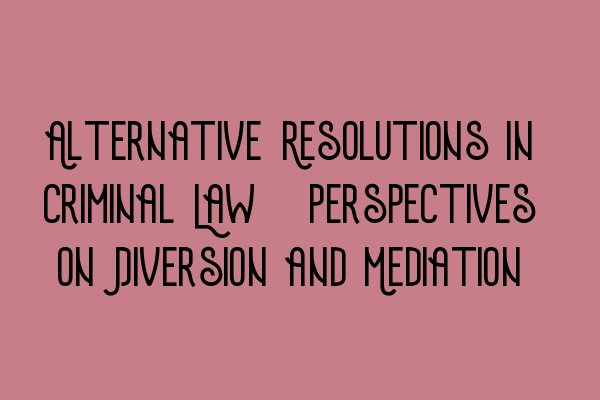Alternative Resolutions in Criminal Law: Perspectives on Diversion and Mediation
In the field of criminal law, alternative resolutions such as diversion and mediation have gained significant attention in recent years. These processes offer alternative paths to justice, focusing on resolution and rehabilitation rather than traditional punishment. This blog post will explore the different perspectives surrounding diversion and mediation, discussing their benefits, challenges, and potential impact in the criminal justice system.
Diversion: A Second Chance
Diversion programs aim to divert individuals away from the formal criminal justice system, particularly first-time and low-level offenders. Instead of facing prosecution and potential punishment, participants engage in specific activities tailored to address the underlying causes of their criminal behavior. These activities may include community service, counseling, education programs, or drug rehabilitation.
One of the key advantages of diversion is its potential to prevent reoffending. By addressing the root causes of criminal behavior, diversion programs can help individuals develop new skills, improve their decision-making abilities, and build a support network within their communities. This approach not only benefits the individual but also reduces the burden on the criminal justice system.
However, there are challenges associated with diversion. Critics argue that diversion may result in leniency, allowing offenders to avoid taking responsibility for their actions. Additionally, the success of diversion programs heavily relies on the availability and accessibility of appropriate resources for rehabilitation. Without adequate funding, support, and supervision, diversion programs may fall short of their intended goals.
Mediation: A Collaborative Approach
Mediation, on the other hand, involves a collaborative process where the victim and offender come together, facilitated by a neutral third party known as a mediator. The goal of mediation is to encourage dialogue, understanding, and ultimately, reaching a mutually agreeable resolution. This approach allows both parties to have a voice, and enables victims to express their feelings, concerns, and seek restitution.
Through mediation, victims may find closure and satisfaction, while offenders gain a deeper understanding of the impacts of their actions. This transformative experience can lead to healing, reconciliation, and a reduced likelihood of reoffending. Moreover, mediation reduces the strain on the court system by resolving cases swiftly and effectively.
However, mediation is not suitable for all cases. Serious or violent crimes may not be appropriate for this process, as it requires a level of willingness and open communication from both parties. Additionally, the success of mediation relies heavily on the competence of the mediator and the willingness of the parties to actively engage in the process.
The Future of Alternative Resolutions
As the criminal justice system continues to evolve, alternative resolutions like diversion and mediation hold potential in addressing the limitations of traditional punitive approaches. By focusing on rehabilitation, restoration, and community involvement, these alternative paths offer a more holistic and individualized approach to justice.
Law firms and legal professionals have an essential role to play in advocating for alternative resolutions and ensuring their effectiveness. By staying up-to-date with the latest developments in criminal law and participating in relevant training courses, such as SQE 2 Preparation Courses and SQE 1 Preparation Courses, solicitors can better serve their clients by exploring alternative resolution options.
It is important to note that alternative resolutions are not meant to replace the traditional criminal justice system entirely. Rather, they provide additional avenues to address specific cases and individuals with unique circumstances. Integrating diversion and mediation into the criminal justice system requires careful consideration, collaboration among legal professionals, and ongoing evaluation to ensure their effectiveness and fairness.
In conclusion, diversion and mediation offer innovative approaches to criminal law, focusing on resolution, rehabilitation, and the interests of all parties involved. Embracing these alternative resolutions can lead to more positive outcomes for offenders, victims, and society as a whole. For more information on the SQE criminal law and practice, including SQE exam dates, feel free to visit SRA SQE Exam Dates.
Related Articles:
